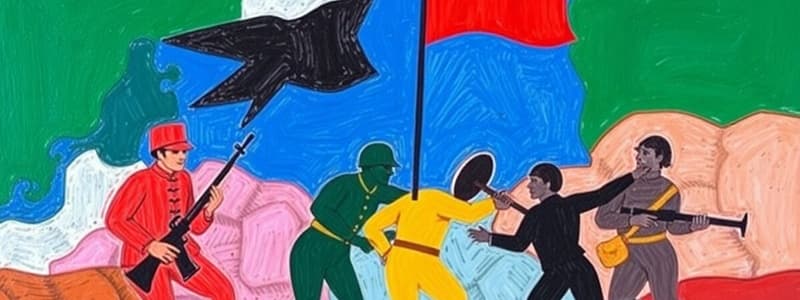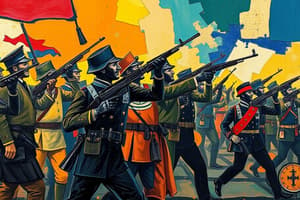Podcast
Questions and Answers
What was the main reason Germany declared war on Serbia in 1914?
What was the main reason Germany declared war on Serbia in 1914?
- Serbia refused to allow Austria-Hungary to investigate the assassination of Archduke Franz Ferdinand. (correct)
- Germany was concerned about Austria-Hungary's dwindling influence in the Balkans.
- Serbia's alliance with Russia posed a direct threat to Austria-Hungary's interests.
- Serbia mobilized troops on the Austrian border, threatening Austria-Hungary's security.
Which of the following was NOT a major cause of World War I?
Which of the following was NOT a major cause of World War I?
- Nationalism, which fostered a sense of superiority and rivalry among European powers.
- Militarism, characterized by the rapid build-up of armies and advanced weaponry.
- Growing religious tensions between Catholic and Protestant nations in Europe. (correct)
- Imperialism, driven by the desire for colonies and resources.
How did the alliance system contribute to the escalation of tensions in Europe before World War I?
How did the alliance system contribute to the escalation of tensions in Europe before World War I?
- It triggered a chain reaction of declarations of war, as alliances obligated countries to support their allies. (correct)
- It led to a peaceful diplomatic process through which nations could resolve their differences.
- It created a system of checks and balances that prevented any single nation from becoming too powerful.
- It ensured that every major power in Europe had a strong military force to defend itself from threats.
Which of the following events directly contributed to the United States entering World War I?
Which of the following events directly contributed to the United States entering World War I?
What was the Fourteen Points, as proposed by President Wilson, intended to achieve?
What was the Fourteen Points, as proposed by President Wilson, intended to achieve?
What is "total war" as it relates to World War I?
What is "total war" as it relates to World War I?
What is meant by "self-determination" in the context of Wilson's Fourteen Points?
What is meant by "self-determination" in the context of Wilson's Fourteen Points?
What was a major consequence of Germany's decision to resume unrestricted submarine warfare?
What was a major consequence of Germany's decision to resume unrestricted submarine warfare?
What was one of the deeper trends that contributed to the outbreak of WWI?
What was one of the deeper trends that contributed to the outbreak of WWI?
How did the assassination of Franz Ferdinand impact Austria-Hungary's actions?
How did the assassination of Franz Ferdinand impact Austria-Hungary's actions?
What was identified as a result of poor communication among countries during WWI?
What was identified as a result of poor communication among countries during WWI?
Which statement best describes the role of alliances in the lead-up to WWI?
Which statement best describes the role of alliances in the lead-up to WWI?
What technological advancement significantly influenced the speed of warfare during WWI?
What technological advancement significantly influenced the speed of warfare during WWI?
What was the estimated number of civilian lives lost during the conflict?
What was the estimated number of civilian lives lost during the conflict?
Which leader was NOT one of the prominent figures at the Paris Peace Conference?
Which leader was NOT one of the prominent figures at the Paris Peace Conference?
What was one of the restrictions placed on Germany by the Treaty of Versailles?
What was one of the restrictions placed on Germany by the Treaty of Versailles?
What was a consequence of the influenza pandemic in 1918?
What was a consequence of the influenza pandemic in 1918?
What term refers to the territories administered by Western powers after the conflict?
What term refers to the territories administered by Western powers after the conflict?
What aspect characterized the human toll of the war?
What aspect characterized the human toll of the war?
What was one of the primary aims of the League of Nations?
What was one of the primary aims of the League of Nations?
Which new nation was formed as a result of the post-war changes?
Which new nation was formed as a result of the post-war changes?
What primary factor contributed to the horrendous smell experienced in the trenches?
What primary factor contributed to the horrendous smell experienced in the trenches?
What gas was used to penetrate the protection of gas masks during WWI?
What gas was used to penetrate the protection of gas masks during WWI?
Which country first introduced gas attacks, and in what year?
Which country first introduced gas attacks, and in what year?
What was a common misconception about soldiers’ exposure in No Man’s Land?
What was a common misconception about soldiers’ exposure in No Man’s Land?
What was a significant change in women's roles during WWI that contributed to the suffrage movement?
What was a significant change in women's roles during WWI that contributed to the suffrage movement?
What was a notable psychological effect observed in soldiers instead of PTSD during WWI?
What was a notable psychological effect observed in soldiers instead of PTSD during WWI?
Why did women distribute white feathers during WWI?
Why did women distribute white feathers during WWI?
What was one of the major challenges women faced while working during the war?
What was one of the major challenges women faced while working during the war?
Flashcards
Triple Alliance
Triple Alliance
Alliance formed in 1882 comprising Germany, Austria-Hungary, and Italy.
Triple Entente
Triple Entente
Alliance formed by Russia, France, and Britain, established in 1907.
MAIN causes of WWI
MAIN causes of WWI
Militarism, Alliances, Imperialism, and Nationalism identified as key causes of World War I.
Balkan Powder Keg
Balkan Powder Keg
Signup and view all the flashcards
Archduke Franz Ferdinand
Archduke Franz Ferdinand
Signup and view all the flashcards
Unrestricted Submarine Warfare
Unrestricted Submarine Warfare
Signup and view all the flashcards
Wilson’s Fourteen Points
Wilson’s Fourteen Points
Signup and view all the flashcards
Total War
Total War
Signup and view all the flashcards
Human Toll
Human Toll
Signup and view all the flashcards
Economic Toll
Economic Toll
Signup and view all the flashcards
Paris Peace Conference
Paris Peace Conference
Signup and view all the flashcards
League of Nations
League of Nations
Signup and view all the flashcards
Treaty of Versailles
Treaty of Versailles
Signup and view all the flashcards
Armistice
Armistice
Signup and view all the flashcards
Self-determination
Self-determination
Signup and view all the flashcards
Mandates
Mandates
Signup and view all the flashcards
Causes of WWI
Causes of WWI
Signup and view all the flashcards
Assassination of Franz Ferdinand
Assassination of Franz Ferdinand
Signup and view all the flashcards
Alliance System
Alliance System
Signup and view all the flashcards
Nationalism and War
Nationalism and War
Signup and view all the flashcards
Poor Communication
Poor Communication
Signup and view all the flashcards
Mud in Trenches
Mud in Trenches
Signup and view all the flashcards
Mustard Gas
Mustard Gas
Signup and view all the flashcards
Shell Shock
Shell Shock
Signup and view all the flashcards
Women's Roles
Women's Roles
Signup and view all the flashcards
Challenges for Women Workers
Challenges for Women Workers
Signup and view all the flashcards
Gas Mask Protection
Gas Mask Protection
Signup and view all the flashcards
Trench Conditions
Trench Conditions
Signup and view all the flashcards
Study Notes
European Powers Form Alliances and WWI Causes
- Triple Alliance (1882): Germany, Austria-Hungary, Italy. Later known as the Central Powers.
- Triple Entente (1893): Russia, France, and Britain. Later known as the Allied Powers.
- Main causes of WWI: Militarism, Alliances, Imperialism, Nationalism.
Balkan Powder Keg, Alliance System, and War
- Archduke Franz Ferdinand assassinated by a Serbian nationalist group.
- Austria-Hungary declared war on Serbia.
- Serbian nationalists thought they could defeat Austria-Hungary with Russia's help.
- Austria-Hungary demanded Serbia cooperate in the investigation of the assassination.
- Alliance system led to a war with multiple sides.
- The war began July 28, 1914.
United States Enters The War
- Unrestricted submarine warfare was a major factor in the US entering the war.
Studying That Suits You
Use AI to generate personalized quizzes and flashcards to suit your learning preferences.




